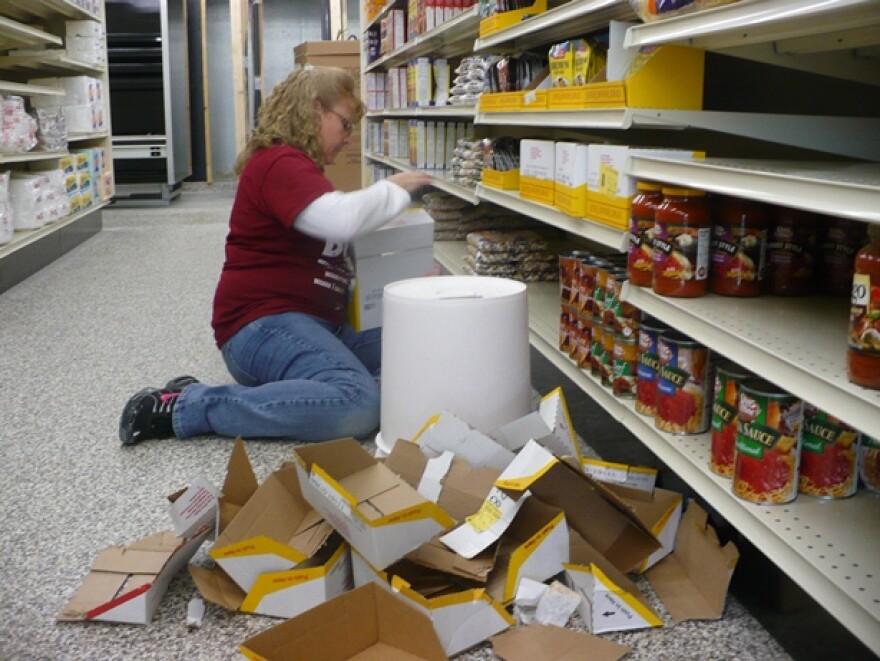http://stream.publicbroadcasting.net/production/mp3/kcur/local-kcur-994665.mp3
Onaga, KS – Last December, the only grocery store in Onaga burned down. Onaga is a town of about 700 in northeast Kansas, surrounded by cattle ranches, corn and wheat farms. But suddenly, there was no place to buy groceries for 25 miles in any direction.
People in town found their routines changed dramatically. Althea Sender, for example, is 86 years old, lives alone and doesn't drive long distances.
"You're baking - you know - or fixing something and you need something. Well, you can't just run down to the store and get it," Sender says.
She used to go the grocery store every few days to pick up what she needed. Now, she makes a lot of lists, and waits to ride to the store with her daughter, or takes a weekly van sent by Potawatamie County to take the towns' elderly and disabled to the grocery store in St. Mary's, 30 miles away. The local restaurant also started carrying a few extra products, and the convenience store at the gas station expanded its offerings. Those who can, mostly drive the long distances to shop.
A Rural Food Desert
Since losing its store, Onaga's become what's called a rural food desert - where residents live more than 10 miles away from anywhere that sells groceries (in urban areas the distance is one mile). According to the United States Department of Agriculture, 23.5 million people in the US live in food deserts, more than two million of them are in rural areas.
Rural America has been losing its grocery stores for decades. Fewer people are living in the countryside, and mom and pop markets aren't able to compete with large chains.
Economic Impact
The impact goes beyond access to fresh food. Onaga's grocery store was the anchor of the town's business district. At the local branch of Morrill & Janes Bank, vice president Dan Peters says Onaga's pharmacy and hardware store are among those struggling now that the grocery store is gone.
"People now [think], 'I have to drive and get my groceries . . . so instead of coming to the local hardware store I'll just stop at Home Depot or some hardware store out of town while I'm there," Peters said. Without a grocery store, he says, it's hard to keep residents.
"When you start losing population, you start losing the ability to keep your infrastructure in town going," Peters said. "Property valuations go down and it just snowballs until what's left of the town? There's not much there."
Finding a New Operator
Town officials recognized the danger, and when the owners of the previous grocery store decided not to rebuild, they began aggressively courting other operators. There weren't any takers, until Pam Budenbender came along.
Budenbender and her husband own businesses in Kansas City, but they spend their weekends on a farm outside of Onaga.
"I had always said it was my retirement plan," Budenbender said. "I was going to go into the grocery business."
She just hadn't planned on opening the store so soon.
"It's very expensive to undertake from the ground up," Budenbender said. "And, if it had not been for Morrill & Janes Bank and their support . . . helping me negotiate the deal with the city, I don't know that I would have wanted to take on the entire project."
Banker Dan Peters and county officials helped Budenbender put together a package of low-interest rural development loans. But it wasn't enough to cover costs, so the Onaga City Council decided to do something unusual. They kicked in $375,000 dollars towards the new building.
Mayor Gary Holthaus says it's an investment in the future.
"I feel you need to do those things in rural communities if you want to survive," Holthaus said. "You can't just ignore the issue and say it'll be alright . . . it won't be."
Public-Private Partnerships in the Rural Grocery Business
That realization is coming to many towns in rural America. In the last three years, Kansas alone has lost more than 1/3 of its small-town grocery stores. But Onaga is one of at least a dozen towns to come up with a creative way to finance a new store. Some have opened them as non-profits. In others, residents buy shares in the stores. There are a few places where high school students are taking charge.
David Procter, who runs Kansas State University's Center for Community Engagement, is helping plant the seeds for some of these new stores. It's part of the Center's Rural Grocery Initiative.
"More and more, we find in rural parts of the state and country . . . a partnership between public and private dollars that go into to establish and sustain these grocery stores," Procter says. (Hear an extended interview with David Procter about opening and supporting rural grocery stores.)
Ribbon-Cutting at Onaga Country Market
The new 6000-foot grocery store in Onaga is set to open December 1, 2011. Pam Budenbender watches as the first shipments arrive, and the staff begins stocking the shelves.
" I think it didn't really become real to me until today when the food started going on the shelves," Budenbender said.
But she worries that Onagans may have gotten used to shopping far from home in the past year. So to introduce the new store to the community, she plans to raffle off free hams and ice cream during the opening weekend. Businesses in town are counting on the grocery store to bring customers back, and maybe even draw in people from the rest of the region.
This story was produced for KC Currents. To listen on your own schedule, subscribe to the KC Currents Podcast.


